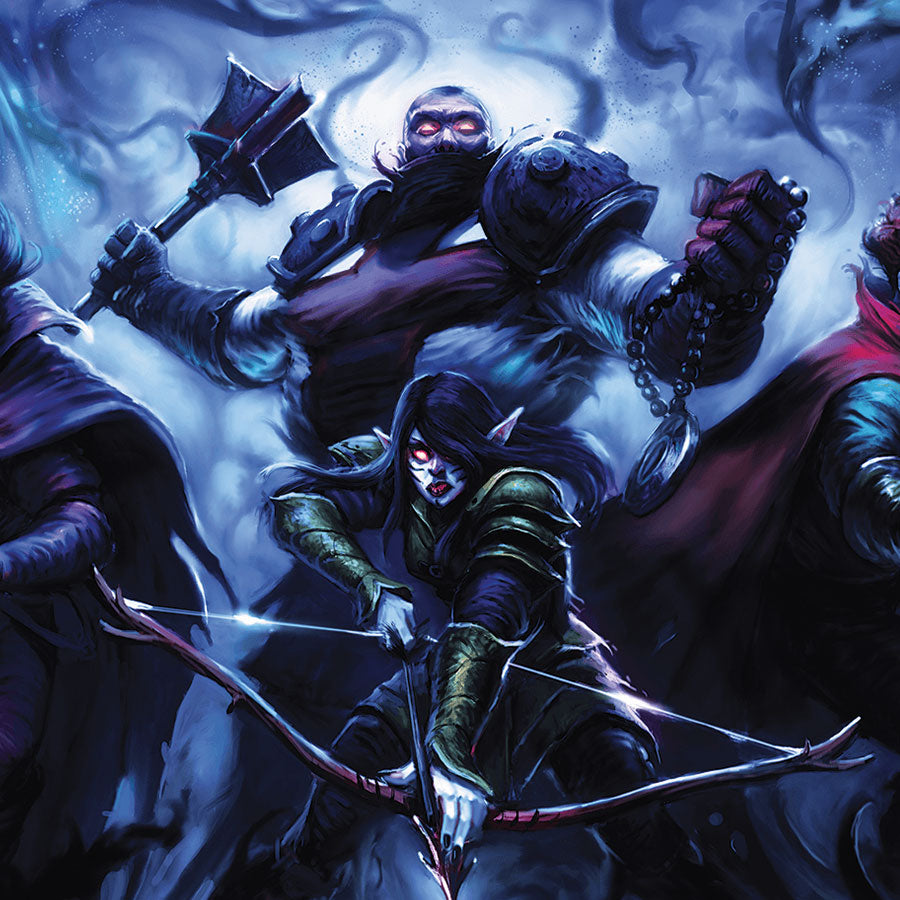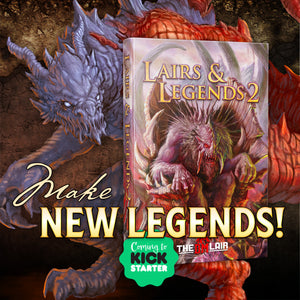The Problem of Allies | How to Handle NPC Helpers and Hirelings in D&D

This is a classic situation across tabletop RPGs everywhere: players seek out allies, NPCs, and hirelings that might help them on their adventures. They use diplomacy, deception, and cold hard cash to obtain such assistance.
However, that leaves the game master in a bit of a dilemma. Should they adjust the adventure to account for the NPC assistance, or leave it as-is, likely resulting in a much easier—perhaps even—trivial adventure that may not be satisfying for players.
Today we discuss the various options a GM has at their disposal and attempt to answer the question of what indeed a game master should do when their players bring on additional NPCs and hirelings to help them out on their quests.
By the way, if you’re a busy game master looking to reduce your prep time, we got your back. Every month my team and I publish a new issue of Lair Magazine loaded with 5e and Pathfinder 2e encounters, adventures, monsters, puzzles, traps, maps, and other resources you can use in your gams. Everything is designed to be dragged and dropped into your existing campaign, too!
Watch or listen to this article by clicking the video below.
This is what happened recently in my D&D game…
In my Ancient Dragon D&D game—where the characters are now level 18—one of the players suggested that they might use the Gate spell to begin summoning powerful extra-planar beings to help them out. Now, this is a 9th level spell that requires the use of a diamond worth 5000 gp, but the summoned creature stays permanently once it comes through, and there is no restriction on how powerful the creature might be.
My players could summon a level 21 solar, for instance, and perhaps convince it to help them out. After all, the group is fighting the encroachment of the Void which threatens all of the multi-verse; so why wouldn’t a powerful angelic creature agree to help them out? At least, that was my player’s reasoning. And, assuming they can get enough of these 5000 gp diamonds—what prevents the party from spending say a week and getting a new powerful ally each day?
And this, naturally, presents a conundrum for the dungeon master. If the group summons just one level 21 solar to aid them, and the solar marches with them into combat, whatever the DM had planned for that adventure likely just became a whole lot easier. Now, you might say that’s okay, because it’s their reward for clever gameplay and convincing the solar to help them. However, what if they do it every day for a week, and get 7 solars? Is that still a reward for “clever” gameplay? Or are they cheesing the game system? Because if they march with 7 solars, the adventure didn’t just become easier; it became a cakewalk.
Now, you may be saying, but the point of the game is to have fun, right? So, if that’s fun, why not just allow it. But are you sure that’s fun for all 5 players at the table, and for the game master? In my experience, that sort of thing is only fun for a couple people; everyone else is disappointed that they aren’t being challenged or that they aren’t actually playing the game with their characters or that the solars are stealing the spotlight from them or whatever.
Okay, then, you say the solution is simple: the game master has all the power, so they can just adjust the challenge of the adventure so that it is much harder and accounts for 1 solar or 7 solars accompanying the group. Now, let’s just ignore that having combats with that number of characters and NPC allies is going to bog things down and make high-level combat—which already takes a LONG time in D&D 5e to begin with—take even longer.
Let’s focus instead on this: if the characters brought on allies, presumably to help them out, but then the GM just increases the difficulty of the adventure so that the game remains balanced, what’s the point of having the allies to begin with? What’s the point of paying the cost of combat bog if the solars aren’t actually helping? When, in fact, the solar allies are just making things worse? You might also argue that the GM is stealing player agency by making the adventure harder because they would be invalidating player choice.
Well then, you might say, if you’re going to make it this complicated, and philosophical, and loose your mind, why don’t you just not allow them to have the solar allies in the first place? I mean, the solar might come through the portal and after the characters explain they’d like their help, respond that there are infinite great evils at work in the multiverse that must be combated, and the solar was IN FACT combating another when they were interrupted by the characters’ Gate spell. Thus, they cannot drop what they are doing to adventure with the characters.
In other words, the GM comes up with a roleplaying reason for the solar not to join them. Now, sure, the solar might still give them some useful information, or use some of its magical abilities to help them in that moment—but it won’t adventure with them long-term. The group gets their aid for the next 10 minutes and then it’s done. And, I mean, that’s a fair response, though one that is likely to be supremely disappointing to the player who was all jazzed up to summon a small army of angels to help the group on their quest. It might seem to the player that the GM is simply using GM fiat to kill their fun and squash their idea.
Now, this entire conundrum brings us to an interesting GAME MECHANIC question around allies. You see, in the real world, getting allies to help you makes complete sense. If a group of bad guys are holed up in a house popping off rounds, SWAT wants to breach with overwhelming force, gain surprise if they can, and overcome the threat as quickly as possible and with minimum risk to themselves. They don’t WANT to be challenged; they want to go home to their wives and children.
But this same approach, I would argue, doesn’t work in a game like D&D. Now, your mileage may vary, of course, but most players I’ve met enjoy having a bit of challenge in the game. Not every encounter should be crazy hard, of course, but part of the appeal of playing is to overcome a challenge and feel that sense of accomplishment when you do. If the entire game is crazy easy—because, for instance, you have a small army of solars helping you out—players tend to get bored fast; most of them, at least. There will always be one that loves it and can’t get enough of effortlessly plastering the floor with enemy skulls.
Now, I’m sure folks are already picking apart my example with the solars down in the comments, maybe even explaining that Gate shouldn’t work that way, or that 5000 gp diamonds should be extremely rare in the world—and on and on. However, I would argue that if you’re doing that, you’re missing the point.
Don’t forget that there are multitude of spells and methods for gathering NPC allies in the game. What stops the group from seeking out another adventuring party to help them? Of course, they offer half the pay and loot. Or asking the city guards to lend them a few soldiers because, dang, this problem with kobolds in the sewers threatens the ENTIRE CITY, after all.
In any of the various permutations that the players gathering additional allies could manifest, the game master is left with four choices: Yes, yes but, no but, and no.
Yes, the allies help you, and the adventure is much easier. Yes, the allies help you, but your DM is going to increase the adventure difficulty. No, the allies won’t adventure with you, but they will give you something useful right now. No, the allies won’t adventure with you, and they won’t even help you now.
Okay, yes, that’s all great, Luke, but WHAT IS THE ANSWER? What SHOULD a game master do then? Well, I’m glad you asked. We should probably talk about that, shouldn’t we?
What should the game master do then?
Okay, so how do we FIX the problem of allies in D&D? Well, I don’t think there is a right answer to this, so whatever you choose to do, I don’t think anyone can tell you you’re wrong. However, I will tell you what I PERSONALLY do and why.
The very first thing I do is READ the spell or game mechanic carefully. Many times I’ve found that upon more careful reading, spells or abilities that APPEAR to give crazy powerful game options, actually don’t. Either something is being overlooked or mis-interpreted. So, if a player brings something powerful to the table such as the Gate spell, I’m absolutely going to read it over and see if we’re missing something.
Next, I don’t always do the same thing. Sometimes I allow the players to get their ally, the ally goes with them on adventures, and I don’t adjust a thing. Perhaps the adventure was already going to be challenging, so an ally doesn’t affect it much at all. Perhaps I just want them to feel rewarded by convincing the ally to help, assuming that it was not trivial to do so. Or perhaps I’m just in a generous mood and say screw it.
Other times, I give them the ally and then quickly adjust the encounters in the adventure—that’s not usually that hard, after all. Or I might just adjust the boss fight at the end to make sure it will be challenging, but let the other encounters be easier than originally designed.
Sometimes the NPC they are trying to recruit refuses to adventure with them, and I might even come up with a convincing roleplay reason on the spot. Though, I can tell you that there a few TRIED AND TRUE reasons that almost always work.
First, the NPC isn’t willing to risk their life and limb to go adventuring. After all, adventuring is dangerous work, and that’s why adventurers exist; and the NPC is DEFINITELY not an adventurer, so no thank you, they will pass.
Next, the NPC is busy. I mean who isn’t, right? Everyone has a life they are living. The solars are busy fighting other sources of cosmic evil. The town guards are already hard-pressed to stop the orcs that have been attacking merchant caravans and there is NO WAY they can spare even a couple to help the group with the kobolds in the sewers.
Now, sometimes the NPC who refuses to adventure with them might help the characters in other ways. The solar raises their fallen fighter from the dead. The town guard offers the characters a few weapon and armor upgrades to help them out—finally, plate armor before level 5, SCORE! And then other times, the NPC tells them to just bugger off and that’s the end of it.
My approach varies NOT become I’m fickle, sometimes generous, sometimes stingy, sometimes kind, sometimes mean. It varies because as I’ve said before, in games such as D&D VARIETY reigns. It feels great when an NPC helps the group defeat their foes, but if you do that too much, it gets stale. However, if NPCs always turn the group down, that can be a bummer and make the players feel the GM just has it in for them.
The next thing I do with my groups is TALK TO THEM about the problem of allies when a particularly troublesome instance comes up. For instance, if the group’s druid gets access to Conjure Woodland Beings and decides they are going to summon pixies to turn all the characters into T-rexes for nearly every combat—you better believe we’re going to talk about that as a group. Or if they are literally assembling an army of celestials over their downtime; yeah, there’s going to be a discussion.
Please, please, please, do not underestimate the value of simply laying everything out on the table and having a frank discussion with your players. I’ve usually found players to be quite reasonable when they understand what’s going on behind the screen with something that SEEMS as simple as gathering a few NPCs to help them out on a quest.
The next thing deals with how I handle it at the table when the group DOES have NPC allies helping them out on their adventures. First, I almost always have the players run the NPCs when they are in combat. The last thing I want as a GM is another stat block to run during an encounter. Furthermore, there is a conflict of interest when I’m simultaneously running the bad guys and NPC good guys in combat. Thus, I’d rather just be on ONE SIDE, not both.
Second, I use a morale system that determines whether an NPC stays to fight or flees. At certain points during the combat, the NPC might have to make a morale check: the first time they take damage, when they are at 50% health, when they are at 25% health, or when they see an ally drop to 0 hit points and go down. Now, this morale check isn’t a codified game mechanic in my games. Sometimes I roll a die to determine what the NPC does; sometimes I just decide. Sometimes I don’t do morale checks at all.
For instance, the first time the mercenary the group hired to go with them takes a nasty wound, I might just decide that he’s calling it a day and retreating. After all, I had been roleplaying him as greedy and undependable from the start. For the seasoned town guard whose commanding officer ORDERED them to help the group, I might roll a d6 at each of those critical points I mentioned, and only if a 1 comes up will they retreat. However, the solar gave his WORD that he would help the characters stop the Void, and he is willing to die before breaking his sacred oath. So, no matter what happens, the solar is sticking it through. Frankly, I play this kind of loose, and how I do it varies on the circumstance.
The next thing I like to do is have the characters develop a REPUTATION for how they treat their NPC allies. If hireling after hireling dies and the group never raises them from the dead or compensates their grieving families or anything, their reputation will grow and fewer and fewer hirelings will be willing to work with them. And the converse might be true, too. If they treat their hirelings and allies very well, they might have almost no turnover and a line of would-be adventurers waiting for the next hireling opening.
Get that Homebrew Feel without Hours of Work!
Now, if you’re a dungeon master who loves homebrewing, you probably spend lots of time head down doing just that for your 5e or Pathfinder 2e game. However, you probably don’t have enough time to homebrew EVERYTHING for your game.
And that’s exactly how Lair Magazine can help; get that homebrew FEEL without hours of prep. You see, every issue of Lair Magazine contains a variety of 5e and PF2e resources that you can just drag and drop into your game: things like adventures, one-off encounters, monsters, traps, puzzles, and yes, even magic items.
Furthermore, my team and I design Lair Magazine content to make your game easier and faster to prep. From eloquently written read-aloud text, to area descriptions, to roleplaying and encounter notes—everything in Lair Magazine is designed to make running your 5e or Pathfinder 2 game easier!
Reduce some of the frustration and effort of being a game master. Check out all the Lair Magazine issues available here, and get more bang for your buck with the Lair Magazine bundles!
-
Posted in
Game Master How-To Articles







